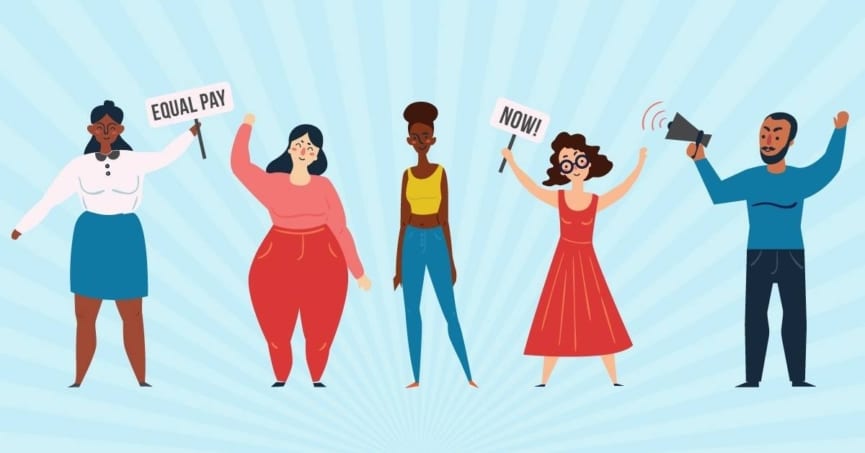In our monthly series, Women’s Funding Network Corporate Spotlight, we take a deeper look at corporations making strides in advancing gender equity, women’s economic security, and women’s leadership. From increasing the number of women on corporate boards and C-level positions to releasing company-wide pay data, committing to transparency in reporting workplace sexual harassment and contributing to the increase of philanthropic funding to women and girls globally, we strive to spotlight those in the private sector who are moving the needle to a more equitable world. Our hope is that this list calls attention to organizations who are accelerating momentum both in their own workforce as well as outside of it in order to inspire change in others.
Our intention is to recognize efforts and initiatives led by companies who create impact. We monitor and rely on data and reports originally released by Bloomberg, Forbes, Equileap and many others.
The companies featured this month have either successfully closed their wage gap or are taking dedicated steps and initiatives to close their wage gaps.
Deloitte
Deloitte, the global consulting giant has been publishing more than just tax reports lately. For the past two years Deloitte has released their gender and ethnicity pay gap reports. The reports show that there is still an 18.1% mean gender wage gap which is mostly due to the lack of senior positions occupied by women. To close this gap, Deloitte is implementing initiatives such as ensuring there is no bias during recruitment, the Return to Work program which focuses on family leave benefits, and female sponsorship and mentoring programs. Although there is still a surmountable wage gap within the company, Deloitte is hoping that their transparency and work towards equal pay will inspire other companies to follow suit. Deloitte is truly living up to their motto of “making an impact that matters”.
[divider] [/divider]
Ernst and Young
Similar to Deloitte, Ernst & Young (EY) is also a multinational firm taking steps to end their gender wage gap. In their 2018 wage gap report, EY found a gender and ethnicity gap, which was mostly credited to the lack of women and minorities in senior positions. To combat this disparity, EY has implemented several company programmes to recruit, retain, and promote their women and minority employees. For example, the Accelerate@EY programme is designed specifically for high potential women to guide them on a path to leadership and the Future Leaders Program aims to promote ethnic minorities into leadership positions through mentorship with senior allies. Although EY’s journey to eliminating their wage gap is still a long road ahead, they serve as an inspiration to other companies who are starting out on their journey to equal pay.
[divider] [/divider]
Salesforce
An avant-garde star in the tech world, Salesforce was one of the first to take action to close the wage gap. Since 2015, Salesforce has spent $8.7 million to close wage gaps in the company. Unlike other companies, they approach the wage gap problem from multiple angles – from prevention to an annual company wide salary review in order to ensure that the wage gaps stay closed. By making equal pay an obligation rather than just an option and being transparent throughout whole process, Salesforce shifted the tech industry’s culture for the better, starting with Salesforce’s very own CEO and co-founder, Marc Benioff. At first a non-believer in gender wage disparity, Benioff fast became one of today’s most influential advocates for equal pay after seeing the numbers for himself. He uses his position to not only ensure his company eliminates wage disparity, but also calls on fellow CEOs and business executives to do the same at their respective companies.
[divider] [/divider]
Adobe
Adobe, the computer software company founded and based in the US with locations worldwide gets this month’s write up as well. In late 2018, Adobe announced it had accomplished its goal of eliminating the gender wage gap in the company across the globe. To achieve equal wages, Adobe first set definitions of the different positions they had in their company to fully evaluate who were being unfairly paid. Once definitions were set, Adobe reviewed and adjusted wages of equal positions accordingly. Further steps have been implemented to ensure that wage gaps would not recur such as excluding salary histories during the recruitment process. Since Adobe has completed its goal, it found that, “These global pay adjustments, including those previously made in the United States and India, impacted less than five percent of Adobe employees and less than 0.2 percent of global payroll costs.” The underwhelming results of the pay adjustments is evidence that Adobe had not been far off from their goal.
[divider] [/divider]
Intel
Intel has continually been a thought leader and trailblazer in the tech world, garnering attention recently for their work developing AI. On top of being a tech superstar, Intel is also a principal of equal pay. In 2017, Intel announced that they had achieved full equal pay for women and minority employees in the US. Not an easy feat to achieve for a company of their magnitude in the industry where the most wage disparity was reported. However, Intel continued their equal pay mission and earlier this year they announced that they had achieved equal pay for women and minorities within their company worldwide, this time also including stock compensations in the calculations. This achievement was accomplished by a thorough investigation of all their 107,000 employees worldwide. Furthermore, Intel recently became a partner of the HBCUvc community, opening up more opportunities for Black and Latinx folks to go into venture capitalism. Through their commitment to diversity and intention on closing the wage gap, Intel has set themselves apart as a prime role model for other companies who are still in the pursuit of pay equality.
